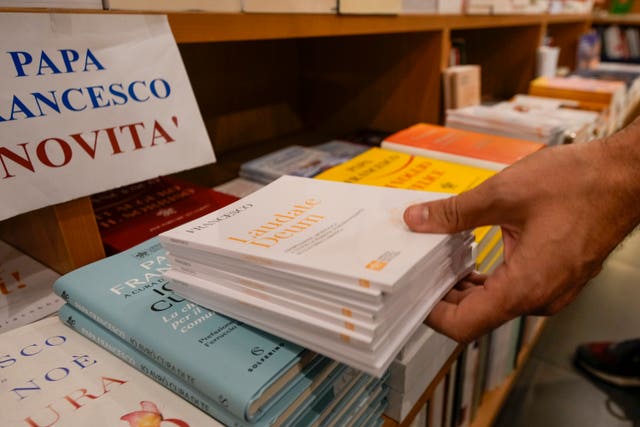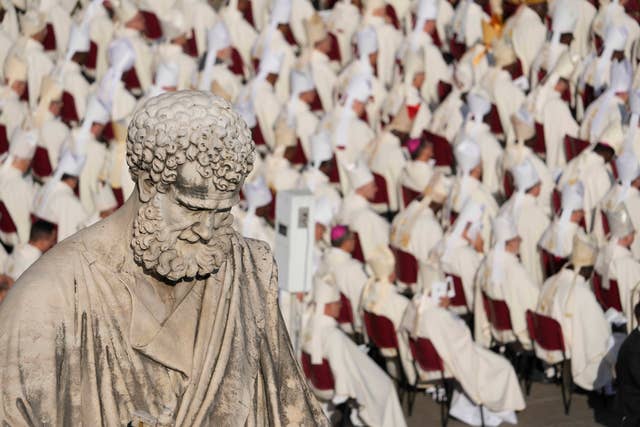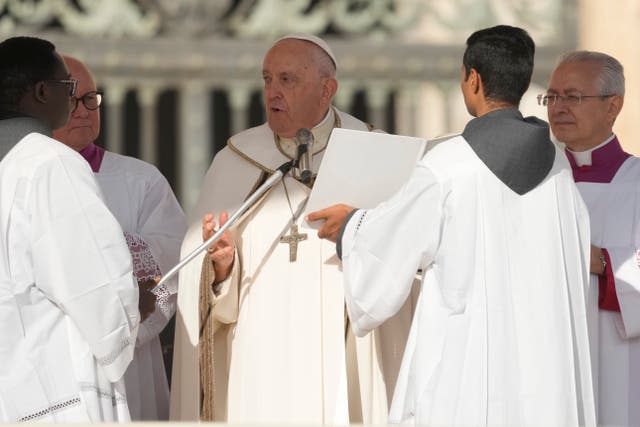Pope Francis has released an update to his landmark 2015 encyclical on the environment in which he shamed and challenged world leaders to commit to binding targets to slow climate change before it is too late.
He warned that the warming planet is fast reaching a “point of no return”.
“We are now unable to halt the enormous damage we have caused. We barely have time to prevent even more tragic damage,” Francis warned.

The document, “Praise God”, was released on the feast of St Francis of Assisi, the pontiff’s nature-loving namesake, and was aimed at spurring negotiators to commit to binding climate targets at the next round of UN talks in Dubai.
Francis heightened the alarm about the “irreversible” harm to people and planet already under way and lamented that once again, the world’s poor and most vulnerable are paying the highest price.
Using precise scientific data, sharp diplomatic arguments and a sprinkling of theological reasoning, Francis delivered a moral imperative for the world to transition away from fossil fuels to clean energy with measures that that are “efficient, obligatory and readily monitored”.
“What is being asked of us is nothing other than a certain responsibility for the legacy we will leave behind, once we pass from this world,” he said.

As it is, Francis’ 2015 encyclical “Praise Be” was a watershed moment for the Catholic Church, the first time a pope had used one of his most authoritative teaching documents to recast the climate debate in moral terms.
In that text, which has been cited by presidents, patriarchs and premiers and spurred an activist movement in the the church, Francis called for a bold cultural revolution to correct a “structurally perverse” economic system where the rich exploit the poor, turning Earth into an “immense pile of filth”.
Even though encyclicals are meant to stand the test of time, Francis said he felt an update to his original was necessary because “our responses have not been adequate, while the world in which we live is collapsing and may be nearing the breaking point.”
He excoriated people, including those in the church, who doubt mainstream climate science about heat-trapping greenhouse gas emissions, sarcastically deflating their arguments and showing his impatience with their profit-at-all-cost mentality.
Shaming them for their reliance on “allegedly solid scientific data”, he said the doubters’ arguments about potential job losses from a clean energy transition were bunk.

And he cited data showing that increased emissions and the corresponding rise in global temperatures have accelerated since the Industrial Revolution, and particularly in the last 50 years.
“It is no longer possible to doubt the human – ‘anthropic’ – origin of climate change,” he asserted.
While acknowledging that “certain apocalyptic diagnoses” may not be grounded, he said inaction is no longer an option. The devastation is already under way, he said, including with some already “irreversible” harm done to biodiversity and species loss that will only snowball unless urgent action is taken now.
“Small changes can cause greater ones, unforeseen and perhaps already irreversible, due to factors of inertia,” he noted.
“This would end up precipitating a cascade of events having a snowball effect. In such cases, it is always too late, since no intervention will be able to halt a process once begun.”
The document was unusual for a papal exhortation and read more like a UN scientific report or a speech to a “Fridays for Future” youth climate rally.
I invite everyone to accompany this pilgrimage of reconciliation with the world that is our home and to help make it more beautiful through our own contribution because our own commitment has to do with our personal dignity and highest values #LaudateDeum https://t.co/yiPrArGaZF
— Pope Francis (@Pontifex) October 4, 2023
It carried a sharp, no-holds-barred tone and its footnotes had far more references to UN climate reports, Nasa and Francis’ own previous encyclicals than Scripture.
“Praise God” was issued ahead of the next round of UN climate talks which begin on November 30 in Dubai.
Just as he did with his 2015 encyclical “Praise Be”, which was penned before the start of the Paris climate conference, Francis aimed to cast the issue of global warming in stark moral terms to spur courageous decisions by world leaders.
In the 2015 landmark Paris Agreement, countries of the world agreed to try to limit warming to 1.5C or at least 2C since pre-industrial times. It has already warmed about 1.1C since the mid-1800s.
Francis said that it was clear that the Paris target will be breached and will soon reach 3C, and that already the effects are obvious, with oceans warming, glaciers melting and the world registering record heatwaves and extreme weather events.
